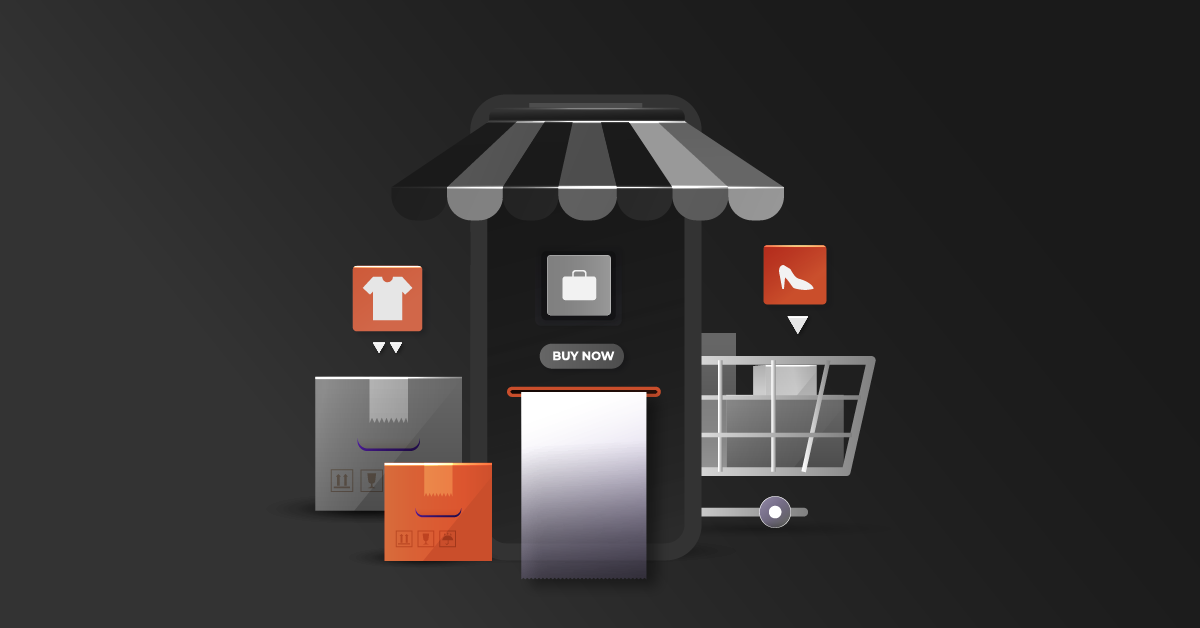Imagine you have a store where you sell products online, like clothes or gadgets. Every time someone orders something, you need to make sure the order is processed, the inventory is updated, and the customer gets their package on time. That’s a lot of work, especially if you have many orders coming in.
Now, with ecommerce automation, you can set up computer programs or tools to do a lot of these time-consuming tasks automatically. Let’s have a closer look at the eCommerce Automation For Distributors.
How eCommerce Automation Works
eCommerce automation means using special computer programs, tools, and technology to make running your online store easier. Instead of doing everything manually, like keeping track of what you’re selling or handling orders, these tools do it for you. They help with things like managing how much stock you have, processing orders, and even promoting your products.
Here’s how it works
- eCommerce automation relies on smart platforms that can adapt to user actions, input, and feedback on websites.
- At the heart of ecommerce automation is AI, which can mimic human actions and thoughts to a certain extent, improving over time.
- Simple AI (Artificial intelligence) performs small tasks like sending emails based on predefined criteria after customer actions.
- AI can learn and improve its performance through machine learning, absorbing new information from user interactions to provide a more personalized experience.
- Machine learning can enhance search functions by analyzing customer search data and adjusting search results to show the most relevant products first.
- AI can customize websites for individual users by recommending new products based on their browsing history and interactions.
- AI-powered chatbots simulate live chat with customers, gathering information and providing assistance based on customer responses. They improve over time to provide more organic and helpful customer interactions.
Also read: ERP Automation Explained (+ Top 5 Processes Simplified)
How to Automate Your eCommerce Business
Here’s how you can get started with ecommerce automation:
1. Identify Repetitive Tasks: Start by identifying repetitive tasks in your eCommerce operations, such as order processing, inventory management, and customer support.
2. Pick the Right Tools: Look for tools that match what you need. Check if they can handle things like managing orders, keeping track of stock, and helping with customer questions.
3. Integrate Your Systems: Ensure that your eCommerce platform, inventory management system, and other relevant systems can integrate seamlessly with your chosen automation tools. This integration allows for smooth data flow and communication between different platforms.
4. Set up Automation Workflows: Once everything is connected, create automation workflows for tasks like processing orders, updating inventory levels, and sending out customer notifications. This way, these tasks can run automatically without needing your constant attention.
5. Monitor and Analyze Performance: Keep an eye on how well your automated processes are working. Check metrics like order processing time, inventory accuracy, and customer satisfaction to see where you can make improvements.
6. Continuously Improve: Finally, don’t stop refining your automation strategies. Listen to feedback from customers and employees and look for ways to make your processes even more efficient and effective over time.
Key Processes to Automate in Distribution
Various types of automation in eCommerce are:
Order Management and Fulfillment
By automating fulfillment operations, businesses can minimize errors and delays, ensuring faster and more accurate order fulfillment. Automation also enables real-time order tracking, providing customers with timely updates on their orders.
Inventory Management and Reordering
Automating inventory management reduces manual effort and errors, leading to better tracking of inventory levels and timely reordering. This ensures that businesses always have the right products in stock to meet customer demand, ultimately increasing sales and revenue.
Customer Relationship Management (CRM)
Automation helps in providing personalized and timely communication to customers, improving customer satisfaction and loyalty. By tracking customer behavior and preferences, businesses can offer targeted marketing messages and product recommendations.
Marketing and Advertising Automation
Businesses can reach a wider audience and increase brand awareness by automating advertising and marketing strategies. Automation also allows for tracking the effectiveness of marketing campaigns, enabling data-driven decisions for future campaigns.
Fraud Detection
Online businesses are vulnerable to fraud, which can result in financial losses. Manual review of orders for fraud is time-consuming and inefficient. The best way to deal is through ecommerce automation, especially AI fraud management systems, which can detect and cancel high-risk orders, such as those involving multiple cards or unusually large purchases. This leads to fewer chargebacks, happier customers, and increased revenue.
Payment Processing
Automated payment solutions streamline financial operations for ecommerce businesses. They reduce the time and resources spent on accounts payable (AP) and accounts receivable (AR) processes, allowing business owners to focus on business growth. AP and AR automation also minimizes manual processes and prevents finance teams from becoming overworked. Integrated payment solutions like KIP enable faster invoice processing, error reduction, and cost savings.
Importance of eCommerce Automation for Distributors
Ecommerce automation is super important for distributors. Here’s why it’s so crucial:
1. Saves Time: With automation, distributors don’t have to spend hours doing repetitive tasks like updating inventory or processing orders. Instead, special computer programs take care of these jobs quickly and accurately.
2. Reduces Errors: When humans do things manually, there’s always a chance of making mistakes. But with automation, the chances of errors are much lower. This means fewer mix-ups with orders and happier customers.
3. Improves Efficiency: By automating various tasks like order processing and inventory management, distributors can focus on high value work. They can handle more orders in less time, which means more sales and happier customers.
4. Better Customer Service: With automated workflows, distributors can focus more on providing great customer service. They can respond to customer inquiries faster and make sure customers get what they need promptly. Improved response time and better service from the customer support team always ensure better customer retention.
5. Scales Your Business: As a distributor, you might want to grow your ecommerce business over time. Ecommerce automation makes scaling up easier because it can handle larger volumes of orders without needing to hire a bunch of extra people.
Also read: Digital Transformation in eCommerce: All You Need to Know
Challenges of eCommerce Automation in Distribution
eCommerce automation in distribution brings great advantages, but it also comes with its fair share of challenges. Let’s break down some of the main hurdles and things to think about:
Integration with Existing Systems
Making sure that automation tools play nice with the systems you already have in place is crucial. B2B businesses often use complex setups like legacy systems, ERPs, and CRMs. Getting everything to work together smoothly can be tricky. It’s essential to pick automation tools that can easily integrate with your existing systems to avoid disruptions or errors.
Cost and Resources
Automation tools can be pricey, and the setup isn’t cheap either. When considering automation, companies need to think about the upfront costs and ongoing maintenance expenses. Plus, you’ll need skilled staff and the right IT infrastructure to support these tools. It’s a significant investment, so careful planning is key.
Data Security and Privacy
Protecting customer data and sensitive information is crucial in any digital process. With automation, it’s even more important. Businesses need to implement strong security measures like encryption and firewalls to keep data safe from unauthorized access. Regular monitoring and maintenance are also vital to ensure that security measures remain effective over time.
Job Losses and Skill Requirements
Automation can mean that some jobs become redundant, especially those involving manual tasks that can be automated. Businesses need to think about how automation might impact their workforce and plan accordingly. This could involve offering training programs to help employees transition to new roles or developing the skills needed to support automation technologies.
Automate your eCommerce Seamlessly with DCKAP Integrator
As we discussed the challenges, it’s now time to introduce you to the solution, DCKAP Integrator.
DCKAP Integrator excels as the top automation tool for distributors thanks to its user-friendly interface, robust integration capabilities, and scalability. It offers high levels of customization to suit specific areas of your business and ensures smooth data flow across multiple systems. With reliable support and a focus on data security, DCKAP Integrator provides distributors with a cost-effective solution that enhances efficiency and drives growth.
Here is why you should consider it:
- Connectivity: Enables easy integration and connectivity between different applications, systems, and data sources regardless of their location or format.
- Drag-and-Drop Interface: Provides a user-friendly interface with drag-and-drop functionality for designing integration workflows without requiring extensive coding knowledge.
- Pre-built Connectors: Offers a library of pre-built connectors for popular applications and services, allowing end users to quickly establish connections without the need for custom development.
- Data Mapping and Transformation: Allows users to map data fields between different systems and perform transformations to ensure compatibility and consistency across integrated platforms.
- Workflow Automation: Automates complex integration workflows and processes, including data synchronization, migration, transformation, and orchestration, to streamline operations and reduce human error.
- Scalability: Offers scalability to handle growing data volumes and increased integration complexity, ensuring that the platform can support the evolving needs of the business.
- Security and Compliance: Implements robust security measures to protect sensitive data during transit and storage, as well as compliance features to adhere to industry regulations and standards.
- Customization and Extensibility: Allows users to customize integration workflows and extend functionality through APIs, scripting languages, or custom plugins to meet specific business requirements.
Learn more about DCKAP Integrator here or take a look at the interactive product tour.
FAQS
What is eCommerce automation?
eCommerce automation involves using technology and software to streamline and automate various tasks in online retail, such as order processing, inventory management, and customer support. An example could be an automated system that integrates a distributor’s eCommerce platform with its inventory management system. This entire process ensures real-time updates on stock levels, enabling accurate order fulfillment and preventing stockouts.
Who is a Distributor in eCommerce?
A distributor in eCommerce is a business entity that purchases products from manufacturers or wholesalers and sells them to retailers or directly to consumers through online channels. They play a crucial role in the supply chain by sourcing products, managing inventory, and facilitating the distribution management process.
What tasks can be automated in eCommerce for distributors?
Distributors can automate a range of tasks that optimize supply chain processes by inventory management automation, order fulfillment, and logistics, and marketing efforts like email campaigns and social media posts. resulting in improved accuracy, faster order processing, and reduced costs for distributors.
What types of data are automated in eCommerce automation?
eCommerce automation typically automates various types of data, including purchase orders, sales data, inventory data, customer data, shipping and tracking data, product catalogs, payment data, analytics data, and customer support data. Plus, Most eCommerce automation tools offer integration capabilities to connect with existing systems like ERPs, CRMs, and Order management software. These integrations ensure smooth data flow and compatibility between different platforms.
How does eCommerce automation help distributors attract new customers?
eCommerce automation enables distributors to provide a seamless and personalized customer experience, with features such as automated email campaigns, personalized product recommendations, and efficient order processing, attracting new customers and improving retention.
What are the key factors to consider when selecting an eCommerce automation software for distribution businesses?
Important factors include ease of use, integration capabilities with existing systems, scalability to accommodate business growth, reliability, customer support quality, data security measures, and overall cost-effectiveness.
How does eCommerce automation enhance the customer experience for distributors?
eCommerce automation ensures smooth order processing, accurate inventory management, and timely communication with customers, resulting in a seamless and satisfying customer experience, leading to increased loyalty and positive reviews. This can also lead to a larger customer base.
Contents




